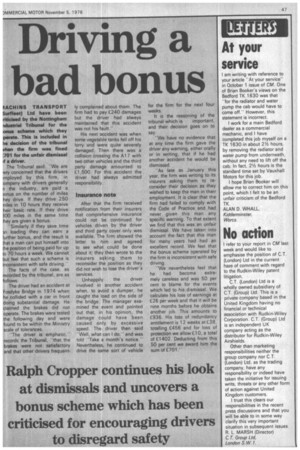Driving a bad bonus
Page 49

If you've noticed an error in this article please click here to report it so we can fix it.
PIACHINS TRANSPORT Surf bet) Ltd have been riticised by the Nottingham ridustrial Tribunal for the onus scheme which they perste. This is included in he decision of the tribunal when the firm was fined 701 for the unfair dismissal of a driver.
The Tribunal said: "We are rery concerned that the drivers imployed by this firm, in :ompany with drivers generally n the industry, are paid a )onus on the number of miles hey drive. If they drive 250 riles in 10 hours they receive heir basic rate. If they drive 300 miles in the same time hey are given a bonus.
"Similarly if they save time )n loading they can earn a Further bonus, and the result is that a man can put himself into the position of being paid for up to 70 hours a week. We cannot but feel that such a scheme is inconsistent with safe driving."
The facts of the case, as recorded by the tribunal, are as follows: The driver had an accident at Fosdyke Bridge in 1974 when he collided with a car in front doing substantial damage. He claimed the brakes did not operate. The brakes were tested the following day and were found to be within the Ministry scale of tolerances.
"The driver is emphatic," records the Tribunal, "that the brakes were not satisfactory and that other drivers frequent ly complained about them, The firm had to pay £240 damages but the driver had always maintained that this accident was not his fault."
His next accident was when some vegetable tanks fell off his lorry and were quite severely damaged. Then there was a collision crossing the Al 7 with two other vehicles and the third party damage amounted to £1,500. For this accident the driver had always admitted responsibility.
Insurance note
After that the firm received notification from their insurers that comprehensive insurance could not be continued for vehicles driven by the driver and third party cover only was available. The firm showed the letter to him and agreed to see what could be done about it; they then wrote to the insurers asking them to reconsider the position as they did not wish to lose the driver's services.
Unhappily the driver involved in another .accident when, to avoid a dumper, he caught the load on the side of the bridge. The manager examined the event and pointed out that, in his opinion, the damage could have been caused only by excessive speed. The driver then said "Well, what can I do:" and was told "Take a month's notice." Nevertheless, he continued to drive the same sort of vehicle for the firm for the next four weeks.
It is the reasoning of the tribunal which is important, and their decision goes on to say: "We have no evidence that at any time the firm gave the driver any warning, either orally or in writing, that if he had another accident he would be dismissed.
"As late as January this year, the firm was writing to its insurers asking them to reconsider their decision as they wished to keep the man in their employment. It is clear that the firm had failed to comply with the Code of Practice and had never given this man any specific warning. To that extent we find that this was an unfair dismissal. We have taken into account the fact that this man for many years had had an excellent record. We feel that the bonus scheme operated by the firm is inconsistent with safe driving.
"We nevertheless feel that he had become extremely careless and was 50 per cent to blame for the events which led to his dismissal. We calculate his loss of earnings at £26 per week and that it will be nine months before he obtains another job. This amounts to £936. His loss of redundancy entitlement is 12 weeks at £38, totalling £456 and for loss of protection we allow £10, a total of £1402. Deducting from this 50 per cent we award him the sum of £701."
































































































